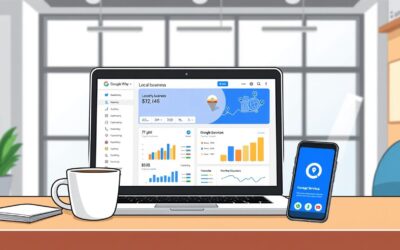Niche businesses can make about 20% higher profit margins than others. This is because of their focused niche SEO strategy. By targeting a specific target audience, companies become top names in their industry. They also get more organic traffic, better conversion rates, and stronger brand loyalty.
Did you know 73% of online activity starts with a search engine? This shows how crucial SEO is today. For niche markets, this means a big chance to attract dedicated customers and beat the competition. If you have a niche business or need a sharp marketing strategy, special SEO methods are critical.
Niche SEO goes beyond basic search engine plans. It focuses on finding keywords with little competition and long-tail queries that lead to sales. It’s about creating custom content for the unique needs of a specific group of customers. This approach helps engage more users and provide experiences that meet their exact needs.
By focusing on a niche, you face less competition in search results. This makes it easier to rank high and boost brand visibility. With a dedicated niche seo strategy, your online visibility attracts more targeted traffic. This means turning visitors into loyal customers and your efforts into profits.
Mastering niche SEO offers great rewards. It leads to higher profits and makes your brand a top choice for consumers. Here is the key to making the most of niche SEO. It helps you grow your business, stand out in your industry, and make every visit worthwhile.
Understanding Niche SEO and Its Importance
Niche SEO has become crucial for businesses wanting to connect more intimately with their audience. By focusing on niche markets, companies can create content that speaks directly to a specific group. This approach improves visibility and attracts high-quality traffic to their websites.
To effectively implement niche SEO, a solid foundation in search engine optimization is essential. For a comprehensive overview, explore our guide to search engine optimization and Google Search to ensure you’re building on the best practices.
Defining Niche SEO
Niche SEO tailors search engine optimization strategies to meet the needs of a particular audience within a niche market. It zeroes in on the unique aspects of products or services cherished by a dedicated group. The goal is to rank highly in search engine results.
Benefits of Focusing on a Niche
- Reduced Competition: Focusing on profitable niches can lead to reduced competition and higher relevance. Discover profitable niches for digital marketing in 2024 to align with current industry trends and maximize reach.
- Increased Relevance: The content and keywords match the niche audience’s interests perfectly, boosting engagement and conversions.
- Better Customer Loyalty: Catering to a niche market’s specific needs fosters strong loyalty and customer retention.
Why Niche SEO Leads to Higher Profit Margins
Focusing on niche markets through SEO isn’t just about visibility—it’s also about profitability. Businesses targeting niches often see profit margins increase by 20%. This is because they’re effectively meeting the precise needs of a particular customer group, leading to high conversion rates and efficient use of marketing resources.
To grasp niche SEO’s impact, let’s look at the following key points:
| Aspect | Impact on Niche SEO |
|---|---|
| Search Engine Results | Higher rankings in SERPs from focused content and less competition. |
| Keyword Optimization | Using long-tail keywords specific to the niche attracts more qualified leads. |
| Technical SEO | Site and mobile optimizations cater to the niche audience’s browsing habits. |
| Analytics and Adjustments | Continuous analysis and tweaks based on insights ensure lasting success in niche markets. |
Employing SEO strategies for niche markets helps businesses strengthen their online presence. This powerful approach combines high visibility with increased profitability.
Identifying Your Target Niche
Finding the right niche is key for any niche SEO’s success. It means focusing where passion, expertise, and market chance meet your audience’s needs. We start by looking closely at detailed data and engaging with people directly.
We discover important niche keywords through thorough keyword research. Google’s Keyword Planner is a big help, showing us the search terms our audience uses. Also, Google Analytics tells us about our site visitors’ demographics, like age, gender, and location.
Talking to potential customers is also crucial. We might use Survey Monkey for detailed surveys or do interviews. These methods give us rich information about what our audience really wants and their main concerns.
To understand our market better, we look at Statista and Google Trends. This shows us how big and fast-growing our target markets are. It also helps us make our SEO strategies better and improve the user experience.

We then tailor our marketing and SEO strategies to deeply connect with our chosen niche. This ensures our content and digital presence meet their specific needs.
| Strategy | Tool/Method | Purpose |
|---|---|---|
| Demographic Analysis | Google Analytics | Identifying age, gender, and location of visitors |
| Keyword Discovery | Google Keyword Planner | Finding relevant search terms and niche keywords |
| Market Size Evaluation | Statista | Assessing potential customer base and market opportunity |
| Trend Analysis | Google Trends | Understanding popularity and relevance of topics |
| Customer Feedback | Survey Monkey | Gathering direct user insights and preferences |
In the end, identifying our target niche, engaging with our audience, and refining our methods based on feedback leads to lasting success. It connects us closely with our niche markets.
Performing In-depth Keyword Research for Your Niche
Keyword research is at the heart of a strong SEO strategy. It involves using specialized tools to look into your market’s search habits. This lets you find key insights. These insights help improve your SEO and make a real connection with your audience.
By looking at search volume and competition, businesses can craft content that matches their market’s needs. This helps create content that speaks directly to the interests of your audience.
Tools and Techniques for Keyword Discovery
Beginning this process requires powerful tools like Ahrefs and SEMrush. These platforms offer detailed data on search queries. They help us spot both broad and specific keywords.
By focusing on these keywords, your content will be ready for search engines and your users. This includes finding long-tail keywords which are very specific and usually have less competition.

Analyzing Search Volume and Competition
Knowing how often people search for a keyword is key. It shows how much traffic you might get. Also, checking the competition helps understand the challenge of ranking for these keywords.
For example, “small business SEO” gets searched 2,500 times a month. It shows there’s interest, but it’s also hard to rank for. This means we need smart SEO strategies to stand out.
Below, we have a table showing different keywords, their search details, and how they might help in SEO:
| Keyword | Monthly Search Volume | Keyword Difficulty | Potential for Conversion |
|---|---|---|---|
| small business SEO | 2,500 | High | High |
| cat detective agency | 0 | Low | Low |
| paranormal investigator | 830 | Medium | Medium |
This information helps businesses sharpen their content and marketing. It’s about finding those easier-to-rank long-tail keywords. This approach makes sure your content meets your audience’s unique interests, boosting both engagement and conversions.
Creating Compelling Content That Resonates with Your Niche
In the world of content marketing, creating content tailored for your audience is key. It’s vital for reaching and connecting with them. Understanding your niche’s search intent helps in making content that catches and keeps attention.
Consider using long-tail keywords in your content strategy for SEO niches. They’re great for pulling in relevant visitors and boosting conversions. Keeping headlines and meta descriptions short ensures they show fully in search results, helping improve clicks.
- Keywords and Write: Placing keywords smartly increases SEO visibility.
- Readability: Easy-to-understand content leads to longer visits, signaling quality to search engines.
- Links: Using both internal and external links boosts SEO strength and user experience.
- Media Optimization: Compressing images and adding descriptive alt text makes content attractive and SEO-ready.
Statistical Insights:
| Strategy | Impact | Increase in Engagement |
|---|---|---|
| Niche-specific Content | Higher Shareability | 50% |
| Interactive Elements | Boost in Engagement | 80% |
| Storytelling | Enhanced Retention | 35% |
Interactive elements like quizzes or polls really grab attention, with up to an 80% increase in engagement. Adding real-life stories makes your content more relatable, boosting retention by 35%. Stories help create an emotional bond, making your content more valued.
Visual aids play a crucial role too. In technical fields, things like infographics or videos make complex ideas simpler. Adding creativity, like humor, makes your content not just informative, but also fun and memorable.

Utilizing these methods, businesses can see a big boost in their online presence. A focus on audience feedback and interaction ensures content truly speaks to your niche. This approach can lead to a 25% higher conversion rate than general content does.
On-Page Optimization Tactics for Niche Websites
Make your niche website stand out by effectively optimizing it. You need to understand and use advanced on-page strategies. These strategies are made for your niche’s specific needs and search habits.
Strategic Keyword Placement
Begin with placing keywords strategically to make on-page optimization work. It’s not just about spreading keywords around. It’s about putting them where they matter most. Keywords should be in titles, headings, meta descriptions, and your content’s first paragraph. This will make your site more visible to search engines. Our method makes sure these elements together boost your site’s ranking.
Enhancing User Experience for Better Engagement
Improving user experience is as important as keyword optimization. Your site should be easy to use, fast, and work well on all devices. Using technical SEO improves how search engines and users interact with your site. Good site function and ease of use lead to more conversions and a stronger business.

| SEO Factor | Impact on User Engagement | Contribution to SEO |
|---|---|---|
| Keyword Optimization | Improves relevance and searcher’s interest | Directly affects search rankings |
| Site Usability | Enhances user satisfaction and dwell time | Indirectly influences search rankings through user signals |
| Mobile Responsiveness | Increase in mobile user engagement | Directly impacts Google’s mobile-first indexing |
| Page Load Speed | Reduces bounce rates | Positively impacts Google ranking factors |
Using these on-page optimization tips caters to better functionality. It also helps you stand out in your niche market. Focus on technical SEO and using keywords right. This fully optimizes your site, boosting traffic and engagement.
The Power of Long-Tail Keywords in Niche SEO
Long-tail keywords are a game-changer in niche SEO. They stand out because they’re very specific and aim at market segments with less competition and high conversion rates. Users searching with these specific keywords are often ready to make a purchase. This makes them highly valuable for businesses looking to get the most from their SEO investments.

Even with their lower search numbers, long-tail keywords bring in a lot of web traffic. Research indicates that while top keywords attract 10-15% of searches, long-tail keywords can bring in up to 70% of web views. This shows the vast, untapped market reachable with a smart long-tail keyword strategy.
Using long-tail keywords in PPC ads can mean cheaper costs per click. They’re cheaper because there’s less competition, but they can still get you higher ad spots. This happens without having to spend more money than the big players.
- Higher ROI: Long-tail keywords can turn into higher conversion rates than general keywords.
- Targeted Traffic: These keywords help pull in more specific and interested visitors.
- Lower Competition: There’s usually less competition for long-tail keywords, making top rankings more attainable.
| Keyword Type | Average Search Volume | Conversion Potential | Competition Level |
|---|---|---|---|
| Head Keywords | High | Low | High |
| Mid-Length Keywords | Medium | Medium | Medium |
| Long-Tail Keywords | Low | High | Low |
To really benefit from long-tail keywords, detailed research is key. Tools like Senuto help find low competition, yet highly relevant, keywords. It’s also crucial for businesses to keep up with search trends and user behavior.
Constantly refining how long-tail keywords are used in digital content leads to ongoing niche market success. By zeroing in on these specific terms, companies can boost their online presence and interaction. This directly translates into more sales and stronger customer loyalty.
Mastering Local SEO for Geographically Focused Niches
For local markets like home services, healthcare, or legal help, knowing how to optimize for local search is key. It goes beyond simple SEO skills. It includes many steps to make sure your business stands out to potential local buyers.

Around 46% of all Google searches are looking for something local. This shows how crucial it is to target your SEO efforts geographically. Businesses using Google My Business and local directories see more local interest and sales. Surprisingly, 88% of local searches result in a customer action within a day, highlighting local SEO’s power.
Expanding into local and linguistic niches, like the Spanish-speaking market, can significantly broaden your reach. Discover how Spanish SEO can help you unlock access to over 1 million Spanish-speaking users and tap into new growth opportunities
Optimizing for Local Search Results
To optimize for local search, make your business easy to find in local directories, especially on Google My Business. Being visible is essential, as 83% of people use Google to research nearby businesses. A well-managed listing gives quick access to your details, improving your chances to attract local searchers.
Leveraging Google My Business and Local Citations
Strong listing management is central to local SEO. Google My Business (GMB) lets businesses claim their listing and add photos and details. This enhances user interaction. Also, getting local citations with your business name and contact info boosts your local SEO and credibility.
In areas like legal and financial services, local SEO can be highly competitive. Success often comes to those who handle their GMB profiles well and get good reviews. Reviews on Yelp and other sites can also help strengthen your online presence and trustworthiness.
Using tailored strategies like geo-targeted optimization not only improves visibility but also helps beat competitors in key local search areas. This approach is especially crucial in industries like automotive services, where effective local SEO can quickly turn into sales.
For businesses wanting to lead in their local market, investing in a detailed local SEO strategy is crucial. Building an online local presence can lead to more business growth, customer loyalty, and a lasting edge over local competitors.
Link Building Strategies for Niche Markets
In niche markets, link building is key for high search engine results pages (SERPs) rankings. Knowing the search landscape and audience is crucial for success.
Getting high-quality backlinks from respected sources in your niche boosts credibility and SEO. We explore strategies for niche businesses to improve their online presence.
- Guest Posting: Contributing content to relevant blogs helps establish authority and secure valuable dofollow backlinks.
- Leveraging Influencers: Working with niche influencers can result in genuine backlinks, increasing traffic and link strength.
- Targeted Directories: Using industry-specific directories enhances link relevance and effectiveness.
SEO audit elements like checking the backlink profile reveal strategy gaps and opportunities. Prioritize links that boost search volume and SERP positions.
| Strategy | Benefits | Considerations |
|---|---|---|
| Guest Posting | Diverse backlink profile, enhanced authority | Select platforms that align with your niche |
| Influencer Outreach | Increase brand visibility, authentic link sources | Work with influencers whose audience fits your target |
| Directory Listing | Better local SEO, targeted traffic | Choose directories relevant to your industry |
Integrating internal links improves user navigation and strengthens internal link architecture. This boosts rankings and visibility for niche sites.

An in-depth seo audit evaluates link building effectiveness, refining strategies for high-conversion audiences. It’s a process of measurement, adjustment, and application, enhancing SEO in niche markets.
In conclusion, recognizing the value of each link changes link building strategies. Focusing on quality links and following SEO best practices leads to sustainable growth and industry dominance for niche businesses.
Leveraging Social Media to Amplify Your Niche SEO Efforts
In today’s digital world, social media plays a crucial role in digital marketing. By adding social media to your niche SEO efforts, you enhance your brand’s visibility. You also connect better with your audience, leading to more shares and links.
With over 360,000 posts being made every minute, it’s critical for brands to use smart social media SEO optimization techniques. This strategy makes every post engaging and search-friendly. Here are tips to use social media to support your SEO goals effectively:
Engaging with Your Audience on Social Platforms
Engagement is key online. Making engaging content that clicks with users boosts likes, shares, and comments. These interactions help your site’s SEO by improving user engagement numbers. Remember, every like and share can lead to more backlinks, which are important for search engines.
Collaborating with Niche Influencers
Working with niche influencers boosts your marketing campaigns. Influencers have loyal fans that trust them. Teaming up with them puts your brand in front of an active audience. This not only grows your social media but also increases website visits, helping your SEO since Google values traffic quality and quantity.
To make posts more SEO-friendly, use the right keywords and hashtags. Also, add social sharing buttons to your site to encourage sharing. Track your follower growth, engagement, and click rates to tweak your strategy as needed.
For the best results, keep optimizing and testing your social media and SEO strategies. Focusing on great content, influencer partnerships, and talking directly to your audience will boost both your SEO and your brand.
Enhancing Technical SEO for Improved Search Visibility
To get noticed in organic search results, technical SEO is key. Making sure your website is technically sound with a thorough SEO audit helps it get indexed better. This leads to higher rankings.
Conducting a Technical SEO Audit
A technical SEO audit is critical to find what could be slowing down your site. It looks at site structure and server errors. Fixing these issues helps your site stand out and keeps visitors engaged. In a crowded online world, this audit is a must for a top-performing website.
Improving Site Speed and Mobile-Friendliness
Fast sites and mobile-friendly designs are really important today. They make websites more enjoyable for users and help with SEO. Google now uses mobile-first indexing, making mobile optimization more important than ever. By speeding up your site, you keep people interested longer. This is good for your search rankings.
| Metric | Impact on SEO |
|---|---|
| Site Speed | Higher site speed can lead to reduced bounce rates and improved ranking positions. |
| Mobile-Friendliness | Critical for ranking due to mobile-first indexing; enhances user experience and accessibility. |
| Internal Linking | Boosts link equity and helps with the indexing process of different pages within the site. |
| Domain Authority | Influences rankings by signaling a form of credibility and authority to search engines. |
In the end, technical SEO makes your online presence stronger. It includes doing full audits and making your site faster and mobile-friendly. This builds a strong base for all other SEO activities, pushing your site up in search results. Keeping your technical SEO updated ensures you stay visible and your website works well.
Making Use of Analytics to Measure SEO Success
In today’s world, using tools like Google Analytics is key to checking how well your SEO works. Metrics like organic traffic and keyword performance give insights that help shape your approach. This can lead to better results in search rankings.
Tracking Organic Traffic and User Behavior
It’s important to watch the flow of organic traffic and see how users interact with your site. We look at which keywords bring people in, check the click-through rate (CTR), and see the bounce rate. This helps us understand what catches the viewer’s interest and keeps them on the page.
Adjusting Strategies Based on Data Insights
With data from Google Analytics, we change our SEO efforts to better reach potential customers and be more visible online. We update our content plans based on which keywords work best. And we fine-tune technical details to get more conversions.
| SEO Metric | Importance | Tool Used |
|---|---|---|
| Organic Traffic | Indicates website ranking success | Google Analytics |
| Keyword Rankings | Tracks position for targeted queries | Google Search Console |
| Conversions | Measures effectiveness of visitor engagements | Google Analytics |
| CTR | Reflects the propensity to click on links | AgencyAnalytics |
| Bounce Rate | Assesses content relevance and engagement | Google Analytics |
| Website Authority | Predicts ranking ability in SERPs | Multiple SEO Tools |
By looking closely at these metrics, you can tweak your SEO approach. This will boost your online presence. And lead to better success in your digital marketing campaigns.
Adapting Your SEO Strategy to Algorithm Updates
Google changes its algorithms often. So, an effective SEO plan must be flexible and quick to respond. These algorithm updates affect rankings and the whole digital marketing scene. To stay ahead, you must tweak your SEO to meet these changes.
First, understand what algorithm updates do and how they impact you. Businesses must then quickly change their strategy to keep their online visibility strong. A planned, adjustable approach to SEO is vital.
Keeping your SEO top-notch means always learning and trying new things. For example, as more people use voice search, optimizing for it becomes more important. Making changes for such trends is key to updating your SEO strategy well.
| SEO Focus Area | Importance | Adaptive Strategy |
|---|---|---|
| Mobile Optimization | High | Enhance mobile responsiveness and loading speeds. |
| Content Quality | Critical | Consistently update and revise content to align with user intent and current trends. |
| Technical SEO | Essential | Conduct regular audits to fix crawl errors and optimize site architecture. |
| Local SEO | Important for local businesses | Optimize Google My Business listings and target local keywords effectively. |
| Structured Data | Useful | Implement schema markup to enhance rich snippets in search results. |
| Backlinks | Significant | Focus on acquiring high-quality links from reputable sources. |
Staying updated on SEO trends and being flexible in strategies helps businesses. With these adaptable tactics, your online presence can grow and succeed despite constant algorithm updates.
The Role of Customer Service in Supporting Your Niche SEO
Customer service plays a crucial role in enhancing SEO for your niche. It improves your site’s visibility and engages users. For niche brands, top-notch customer service builds loyalty and boosts the user experience. This, in turn, strengthens your online presence.
When customers feel valued, they’re more likely to share their positive experiences. This action boosts social signals and user-generated content, important for Google’s algorithms. Good customer service meets the specific needs of your niche market. This enhances your brand’s online visibility and SEO rankings.
- Brand Loyalty: Great customer service creates a loyal customer base. This leads to more traffic and engagement on your website.
- Social Proof: Happy customers often leave positive reviews and recommend your products or services online. This increases your social credibility.
Below is a table that shows the real benefits of aligning customer service with niche SEO strategies:
| SEO Factor | Impact by Effective Customer Service | Statistical Boost (%) |
|---|---|---|
| Organic Traffic | Increased through higher engagement and content sharing | Up to 200% |
| Social Media Conversion | Greater interaction leads to higher conversions from niche platforms | 150% |
| Email Marketing Effectiveness | Enhanced by targeted communication frequent replies | 10-15% |
| Brand Credibility via Influencers | Boosts visibility and trust within niche circles | 20-30% |
| Customer Retention and Referrals | Increased retention and organic referrals through exceptional service | 25-35% retention, 15-20% referrals |
Matching customer service efforts with your SEO for your niche greatly benefits your brand. It not only improves user experience but also gives you an edge in the market. This shows the big impact that effective, quality customer service has on growing a niche brand.
Choosing the right SEO services can greatly impact visibility and engagement. Learn about top SEO services in Florida and how these companies can help unlock your potential in digital marketing
Conclusion
We have learned a lot about Niche SEO. It’s clear that being a leader in a smaller market can bring online success. By picking the right niche seo targets, and creating powerful content, businesses can find profitable chances. Focusing on specific audience needs helps grow a business in a sustainable way.
Understanding your audience is key to Niche SEO success. If you know what interests them, you can create content that really pulls them in. Building a connection based on trust can boost your conversion rates. With help from experts like Seahawk, navigating niche markets becomes easier.
Testing Niche SEO shows its true strength. Even though there are challenges, like finding enough search volume, the benefits include making targeted content. For businesses with a physical presence, local Niche SEO can really help them stand out. Ultimately, Niche SEO is crucial for achieving lasting success in the digital world.
FAQ
What is Niche SEO and why is it important?
Niche SEO focuses on optimizing a website for a specific market segment. It’s vital because it cuts down competition. It boosts visibility to an audience that’s highly interested. And, it can lead to better conversion rates and profits.
How does focusing on a niche improve profitability?
Targeting a niche lets businesses customize their products and messages for their audience. This leads to happier customers and stronger loyalty. Ultimately, it aligns what you sell with what your customers want, increasing profits.
How do I identify my target niche?
To find your niche, you need to know your interests and where you’re skilled. Research to see what people are interested in and check out the competition. Talk to potential customers and refine your niche with what you learn.
What are the best tools for conducting niche keyword research?
A: Ahrefs, SEMrush, and Google Keyword Planner are great for niche keyword research. They help you find relevant keywords, check how often they’re searched, and see how competitive they are. This is key for a good SEO strategy.
How do I create content that resonates with my niche?
To connect with your niche, tackle their specific problems, interests, and questions. Create high-quality content that positions you as an authority. This draws the right audience and shows search engines your site is a top resource.
What on-page optimization tactics are key for niche websites?
For niche sites, place keywords strategically in your content, titles, and descriptions. Also, enhance your site’s speed, make it mobile-friendly, and easy to navigate. These steps help keep users engaged and boost your search ranks.
Why are long-tail keywords crucial in Niche SEO?
Long-tail keywords are vital because they have less competition and are more specific. They better capture what users are looking for. This draws in visitors who are closer to making a purchase, increasing your chances of making a sale.
How can I optimize my niche business for local SEO?
For local SEO, make sure your Google My Business profile is up to date. Keep your listings consistent in local directories and get local citations. This helps people nearby find you when they search for what you offer.
What link building strategies are effective for niche markets?
In niche markets, create content that’s worth sharing, guest blog, and partner with other niche sites. Getting relevant backlinks from these sources boosts your site’s credibility and search ranking.
How do I use social media to enhance my Niche SEO efforts?
Use social media to directly talk to your target audience and work with niche influencers. Post content specific to your niche, engage with followers, and use the data to better your approach. This grows your organic reach and engagement.
What should I focus on in a technical SEO audit for my niche site?
In a technical audit, look at site speed, mobile-friendliness, indexing, structure, and security. Fixing these improves the site for users and search engines.
How can I use analytics to measure my niche SEO success?
Use tools like Google Analytics to see your organic traffic, understand user actions, and check keywords. This knowledge helps you tweak your SEO and marketing to better meet your niche’s needs, making your efforts more effective.
Why is it important to adapt SEO strategies to algorithm updates?
It’s crucial to update your SEO strategies because search engines keep changing their algorithms. Staying updated helps your niche site keep its visibility and performance strong.
What role does customer service play in a niche SEO strategy?
Customer service is key to SEO by building strong connections with customers through good support. It also boosts your online reputation, promotes content sharing, and enhances SEO through better engagement.




0 Comments